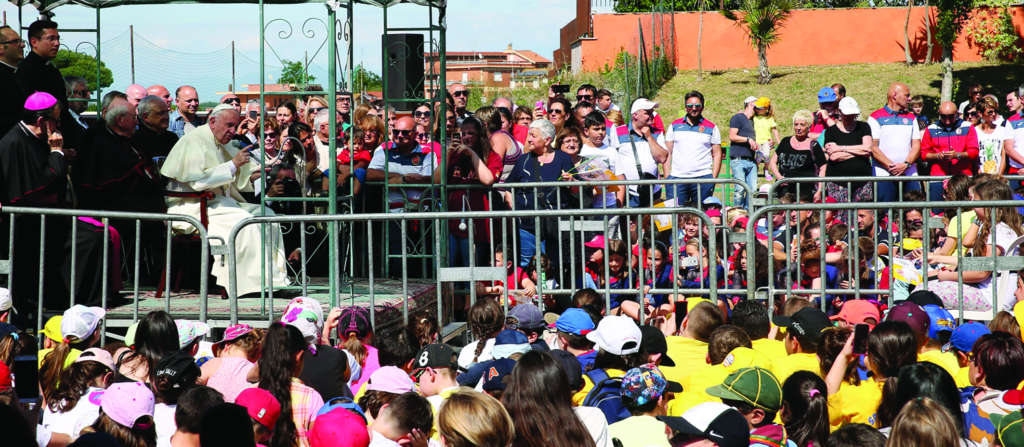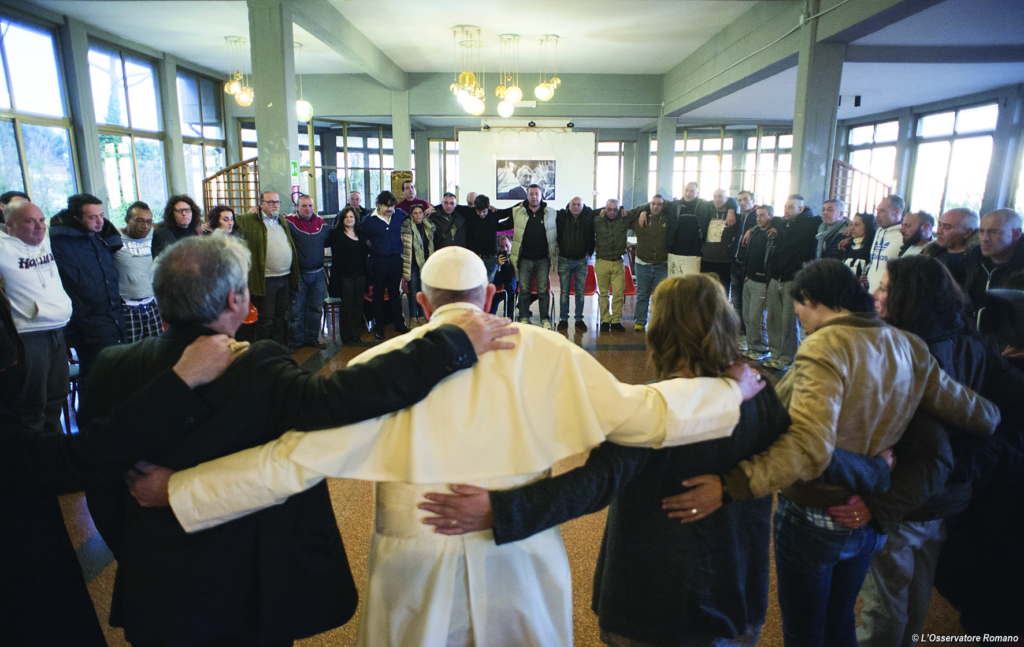One ignored “periphery”: the working class, suffering from family devastation
By Anthony Esolen

Pope Francis’ visit to the Roman parish of Saint Peter Damian at Monti di San Paolo on the southern suburbs of the city on May 21, 2017. The Holy Father meets the children and young people of the parish (Galazka photo)
“This Synodal Process…is intended to enable the Church to better witness to the Gospel, especially with those who live on the spiritual, social, economic, political, geographical, and existential peripheries of our world.”
–From the Vatican’s official Synod on Synodality 2021-23 website
Pope Francis has repeatedly urged his pastors to “smell like the sheep,” that is, to make sure they are among the flock, to get to know their joys and sorrows, to enter into the confusions and the ills of the world they live in, not — to give him the benefit of the doubt — to approve their sins and to confuse them all the more, but the better to diagnose their ills and to provide the right and fitting remedies.
I do not believe, however, that the mainly well-heeled Europeans and Americans who promote what Francis has called the “synodal way” show any intention to mingle with either the most faithful and largely despised sheep or the worst wounded and bleeding. Twice a day does the stopped clock give the right time, and so it is that we can lay a Marxian finger on the otherwise baffling phenomenon, that those who speak the loudest about pastoral rather than doctrinal matters show so little interest in certain large fields of the flock. People of a comfortable social class will tend to support measures that confirm them in their comfort, and that insulate them from unpleasantness without, or from competition and threats to their status.
Anyone looking at the state of the working class in the United States and Canada — I speak of what I know first-hand, though people like the pseudonymous doctor Theodore Dalrymple have made similar observations elsewhere — must see that they have been devastated by fatherlessness, which was a direct and perfectly predictable consequence of a terrible combination, the sexual revolution and the vast expansion of the welfare state.
The teenage boy who is unsocial, sullen, foul-mouthed, pitched by turns into lassitude and unproductive aggression, who never gets within a mile of the church, needs a father.
He is not going to get one, not so long as both Church and state turn demurely aside, as if he were above all to be shunned. Far more comfortable is the “pride” parade; it is a regular bourgeois hobby. The boy may himself think that the parade is good; mass schooling and mass entertainment will have done their work. But he does not need the parade. He needs a father, though he can hardly tell why.
We know why, or we should know why. All human cultures testify to the need. But we will not utter a word about that need, because that would give the lie to our other bourgeois hobby, which is feminism. Let us be clear to one another. Tens of millions of men in the United States alone must work with their hands, their backs, and their shoulders, if they are to land good jobs that will enable them to support a family. Their sisters will not do such work, in part because they have no desire to do so, but largely because they simply lack the physical strength to do it well, or to do it at all. If, then, we are to tend to the poor, we must make ourselves one again with the working class, which, because of the devastation of the family, is ever in danger of toppling over into poverty. We must get on us the smell of quarry dust, hot tar on a new-laid road, machine oil, and earth dredged up.
The family, for the poor, is not to be what it is now, a confusion, unstable, unreliable, mainly unchurched and—not only despite but because of the efforts of schools—uneducated. It must be a rock, as it used to be, when working class Catholic immigrants were less likely than the rich to divorce, and to engage in other family-solvent vices.
But it cannot be so if feminism steers us, because feminism, which Christopher Lasch shrewdly saw as a form of self-insulating western individualism, severs the good of woman from the good of man, and both from the good of the child.
Let all Catholics, clergy and lay, and especially all bishops, ask themselves whom they are more comfortable being around — the professional woman who wants the priesthood to lose its last hold on the paternal, or the young man who knows and cares nothing about the Father, because he never had a real father to show him, and who spends his days lurching between the immoral and illegal, all to no profit, either to himself or others.
We need not ask who gets more attention, the feminist or the fatherless, the gay man or the young fellow who fathers a child out of wedlock and has no idea what it is really to be married and to be a responsible parent. The latter gets no attention at all, and it is because if we did attend to him, we would have to return, ourselves, to the moral demands of our faith that we like the least to observe or to discuss. No, we shun those lost sheep. They stink. We like perfume and cologne and the aroma of catered hors-d’oeuvres a lot better. And I do mean we: for such miseries, proof against the impersonal ministrations of the state and of state-like organizations, are no delight to engage.

Pope Francis visits the San Carlo Community, a Catholic-run drug rehabilitation center on the outskirts of Rome near Castel Gandolfo, Italy, on February 26, 2016. The pope encouraged the 55 patients to trust God’s mercy to keep them strong. (CNS photo/L’Osservatore Romano).
And then there are those who try to remain courageously faithful in a bad time. Here I am speaking about a group I sympathize with, though I am not a member: those who attend Mass in the old Latin rite. Most of these people will have suffered for the faith. If they are teachers working in a faithful Catholic school, they are probably just scraping by. If they are professionals, they often work in places that bristle with antagonism against all they believe. This woman here has a sister who will no longer speak to her, because politics has scorched her faith, her sisterly love, and even common decency. That man there has returned to the faith after living in a moral wasteland, and he still must pay the price for it, and even his friends think he is something of a fool. Here is a woman who has been spat upon for setting up a booth for life, outside of an abortuary. Here is a man, old before his time, whose life was wrecked by a divorce he did not want or seek, who has not married again, because he knew he must not; and no one gives a passing thought to his loneliness. The divorced and remarried man is easier to talk to, because he has a nice house and a new couple of children. The faithful man is hard to talk to, because he is often sad, and because his having done the right thing is a silent reproach to everyone else.
Does anyone bother to do the simple and decent thing, which is to ask the people why they are there, when it often requires so great a sacrifice? I will venture one reason among many. Modernism in art, music, and liturgy is another rich man’s hobby. You cannot compel people to be stirred to the depths of their being by what is banal, barren, reductive, slipshod, minimalist, jejune. Man is made for beauty, which has real and objective existence, though we experience it subjectively. You can say all you want that the church that looks like a factory or a prison or a nuclear power plant or a hedgehog from an alien planet must inspire piety in the Catholics nearby, or else something is wrong with them, they don’t understand, they reject the standards propounded by their betters, and so forth. You may as well demand that people gape at a parking lot instead of a waterfall. You may as well demand that people prefer pocked ceiling tiles to the stars above.
Why not mingle among your sheep, you bishops who despise them for their longing for beauty, which you interpret in the worst possible light, as merely political, merely motivated by hatred? Why not try to see a little through their eyes? Why not, for once, look into their eyes as they pray, and listen to their voices as they chant? Why not talk to them? What are you afraid of? That those sheep do not smell like you, as you wish?





Facebook Comments